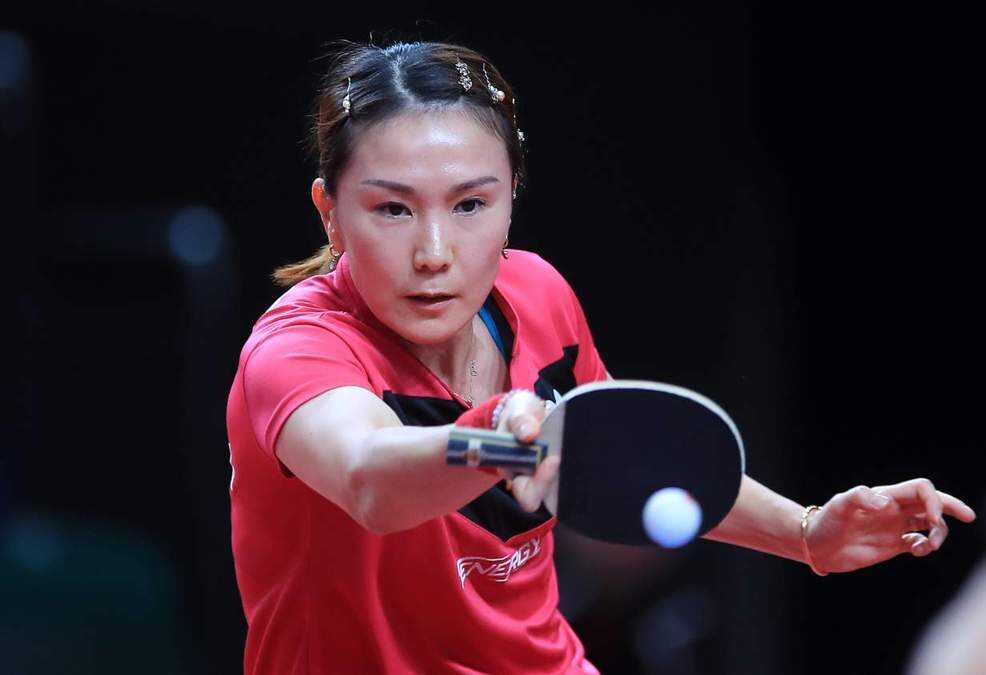
Xiaona Shan
 Germany
Germany

 Germany
Germany
It is never easy to make it to the top of a professional sport, let alone leave your home country and represent another. That is what Xiaona Shan had to do at the start of her table tennis career, managing to make a huge success of it, too! Shan left her home of table tennis, China, also her home country, at 22 and started her journey to stardom. Reaching the top in a foreign country – without your family, friends, and a professional support system – can be a physical but also emotional challenge. In China, aspiring table tennis players can grow up in an environment that would equip and aid them and that would support their dreams, all from a very young age. However, Shan moved away from that and excelled regardless. She made it big in Germany, a much tougher environment to prosper! Read on as we get to know this inspiring and prolific table tennis player.
Quick Facts
Biography
Shan Xiaona is a Chinese-born German table tennis player who was born in Anshan, in the Liaoning Province of China, on January 18, 1983. Growing up, table tennis wasn’t even her favorite sport – she actually liked dancing. Regardless, she started playing table tennis at the young age of eight due to the positive influence of her parents, who were both ping pong players. Shan had practiced up to seven hours a day, but, despite all the work she was putting in, she failed to earn her Chinese stripes. Table tennis was invented in the United Kingdom, the heart of modern capitalism, in the 19th century as an “after-dinner parlor game for the upper class” – few would have imagined that the game would enjoy huge popularity in socialist China one hundred years later.[/trusted_link] after making it to the provincial pre-selection.
She planned to only stay in Germany for a year, but thanks to one of her hometown coaches, she extended her stay for much longer. Now it has been years since her move to Germany, where she managed to accomplish much more than initially expected. Eventually, for Xiaona Shan German became her second language! Shan obtained her German citizenship in 2012, which made her eligible to represent Germany at the World Championships, European Championships, and Olympic Games since.
Career
Her performances and form were consistent, and for Shan Xiaona, the ranking was not necessarily what defined her. Still, she has consistently been in the top 20 and top 30 of the International Table Tennis Federation (ITTF) rankings. She was ranked 24th in the world in 2003, and her highest-ever ranking was 12th in 2017. She holds some notable achievements, such as:
- Bronze medalist at the European Champs in 2022
- Round of 16 at the World Champs in 2021
- Doubles Round of 16 at the World Champs in 2021
- Doubles winner at the European Champs in 2020
- Round of 16 at the World Tour Grand Finals in 2014, 2015, 2016 and 2017
- Doubles winner at the German Open in 2015, Australian Open in 2015, and Korean Open in 2017
- Silver medalist at the European Champs in 2013 and 2020
- Doubles silver medalist at the European Champs in 2013 and 2016
- German Open winner in 2014
- Doubles bronze medalist at the World Tour Grand Finals in 2013
Shan has built up some exciting and sporty rivalries during her illustrious career, such as the famed Chen Ming vs Shan Xiaona rivalry.
Playing style
Shan plays right-handed with a pen-hold grip of her paddle. This means she essentially holds her paddle the same way you’d hold a pen. The thumb and index finger would be in front of the paddle, with the remaining three fingers curled slightly behind the back. Shan is an attacking player who uses short, pimpled rubber on only one side of her paddle. Her style of play is said to be more old-fashioned, adopted mainly by players who were born in the 1980s. It is not necessarily ineffective, but at times it can come second best against more creative and versatile players who adopt different techniques.
She uses a technique where she plays straight, hard shots and where she uses her forehand effectively. This does not take anything away from her backhand, which is solid and precise.
Shan uses this precision in her backhand and combines it with aggressive and fierce forehand shots. This retro style allows her to cover the loop balls well because she never retreats after pushing her attacks, and she plays in short and fast bursts. She is an intuitive player and can be rather unpredictable to play against. Her signature strategy is to push fast, thereby making her opponents uncomfortable, before suddenly attacking with her forehand when the competitors become more relaxed.
Teachers and influences
As already mentioned, one of her hometown coaches, Liu Liping, had convinced Shan to stay in Germany for longer than she originally planned. Liping was her guide in the sport and provided closure for her in a foreign country. This was important at the time because she was still young and vulnerable. Liping was the coach of Busenbach, a club in Germany, and he had inspired Shan to achieve more than what she originally anticipated.
Since Shan’s parents were both table tennis players, they also played a big role in nurturing her talent and potential in the sport. Her parents had assured her when she was still a child that she was talented in ping pong, and that is where she would make a success of herself. For Shan Xiaona, the husband material came in the form of Zhang Yong, who is a coach in the Chinese Super League football tournament. He had also been highly influential in her career. Although he isn’t involved with table tennis, he knows of the difficulties and challenges professional sportspeople can face. In this instance, Yong has played a big role in supporting Shan’s aspirations and journey as a professional table tennis player.
Lessons for aspiring players
Shan’s journey to reaching the top can showcase some valuable lessons for not only table tennis players but for young and aspiring sportspeople in general. She proved that if you fail once like she did when she was still in her home country, you can still get up and succeed. Through persistence, hard work, and never giving up on her goals, she managed to play table tennis still professionally. By her moving to Germany, she also found a way to work around her shortcomings and find solutions, even if it may have been scary for her at the time. She has also shown that you are the best when you stay true to yourself. Even though table tennis had evolved over the years, she stuck to her original styles and techniques that had molded her and made her a success of it.
It is also important – like Shan had shown – also to have a backup plan when you’re trying to pursue a professional sport. She went to Germany to take up table tennis professionally, but she still had a university degree to her name. If your dreams don’t work out, then it is vital you chase other career paths. not only will that be useful in case you don’t make it, but also for when you retire from the sport you’re playing. Sportspeople have short careers, so it’s always clever to think beyond that season in your life. With the right support and guidance, as well as with the right mindset and hunger to succeed, you can achieve your goals. Shan has shown that and has built a long and fruitful career from it.
Videos
Final Thoughts
Ultimately, sportspeople like Xiona Shan can be an inspiration to many. She made a way to play table tennis professionally in unfavorable circumstances. She didn’t quite make it to the top in China, but with perseverance, you can achieve anything that you put your mind to. She ended up making sacrifices – such as leaving the comforts of her home country – to chase her dreams. With this, she ended up creating a life in Germany, which shows that your plans don’t always work out but that sometimes it’s better that way. This sort of inspiration can serve people from all walks of life, whether you’re chasing sports success or any corporate business dream. It shows that you can make something of yourself if you stay true to your strengths, which is precisely what Shan did.

